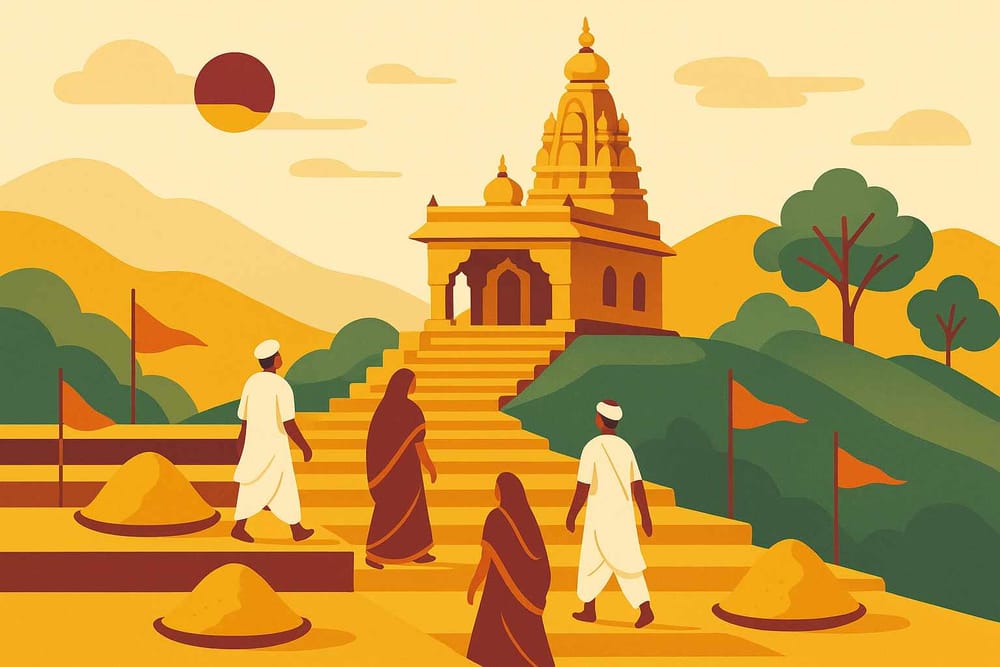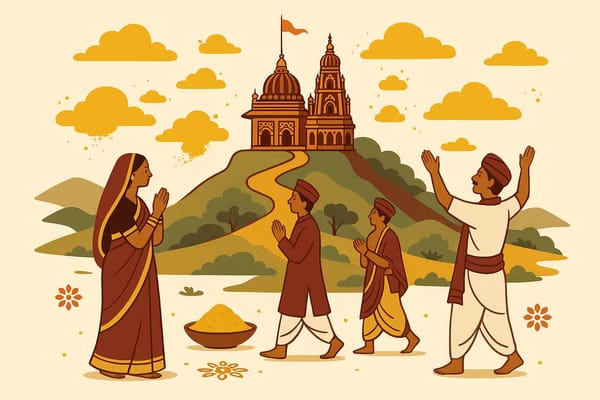
Exploring the Mystical Imagery of Jejuri: Poem's Depths Examined
Have you ever stepped into a place where the air itself feels different, thick with stories and prayers whispered over centuries? That's the feeling of Jejuri for you. It's a sacred town in Maharashtra where the ground, the temples, and even the sky seem dusted with a vibrant, golden yellow. This isn't paint; it's the turmeric powder, the 'bhandara,' thrown in joyous devotion to Lord Khandoba, the warrior deity who resides here. It is this very real, yet completely magical world that poet Arun Kolatkar invites us into with his masterpiece, 'Jejuri'.
Reading his poem isn't just about understanding a place; it's about experiencing it through the eyes of someone who is both a pilgrim and a curious observer. It’s a journey that makes you smile, think, and look at faith in a completely new light.
Who is Lord Khandoba? The Spirit of Jejuri
Before we dive into the poem, let's talk about the heart of Jejuri—Lord Khandoba. He isn't just a distant god in a temple; he is a protector, a guardian for countless families in Maharashtra. People look to him as a symbol of strength, marital harmony, and fertility. The town's very architecture, with its ancient stone temples blending into the rugged hills, feels like a fortress of faith built for this beloved deity. The rituals here are full of life and colour, especially the offering of turmeric, which turns the entire landscape into a breathtaking spectacle of devotion. This is the rich tapestry of tradition that Kolatkar so beautifully captures, but with a modern, questioning eye.
A Conversation Between Faith, Doubt, and Time
So, what is Arun Kolatkar's 'Jejuri' really about? At its core, this collection of poems is a gentle conversation between unwavering faith and honest skepticism. Kolatkar doesn't give us simple answers. Instead, he walks us through the pilgrim's path and points out things we might also notice. He sees the deep belief in people's eyes, but he also sees the crumbling temple walls and the fading paint on idols. This isn't a critique; it's a reflection on the nature of time and how it touches everything, even our most sacred spaces.
He also touches upon how religion and commerce often walk hand-in-hand. He shows us the little shops and the guides, reminding us that a spiritual journey today is often a mix of ancient tradition and modern convenience. This blend is something many of us experience in India's holy places, from the vibrant markets near Pushkar's spiritual heart to the organised darshans at the Shrinathji temple in Nathdwara.
Seeing the Divine in the Everyday: The Mystical Imagery of 'Jejuri'
What makes 'Jejuri' a literary gem is its unique ability to find magic in the mundane. Kolatkar uses striking imagery that stays with you long after you've finished reading. He doesn't focus on grand miracles; he shows us the divinity hidden in plain sight.
Finding Poetry in Imperfection
The poem finds a strange, poignant beauty in what is broken or old. The crumbling pillars, the dusty idols, the worn-out steps—all tell a story about the passage of time. Kolatkar reminds us that nothing is permanent, and there's a certain grace in accepting this. His work shows that questioning and observing closely can be their own form of devotion.
A Dance of Light, Shadow, and Colour
The imagery is stark and unforgettable. The fierce sun and long shadows become characters in the poem, symbolising the play between the clarity of doubt and the mystery of faith. Against the grey, ancient ruins, he paints bursts of life with the vibrant yellow of turmeric and the bright orange of marigolds, highlighting how faith can bloom even amidst decay.
The Sacred in the Small Things
Kolatkar masterfully shows how the sacred and the ordinary are woven together in the fabric of Indian spiritual life. A simple butterfly landing on a stone, a stray dog sleeping in the temple shade, or even a line of stones become objects of deep observation and meaning. This reminds us that divinity isn't just confined to idols; it can be found in the devotion we show to all of life around us.
This beautiful act of making deep traditions understandable and relatable is something we deeply cherish. At Bhaktilipi.in, we believe that spiritual wisdom, whether found in ancient texts or modern poetry, should speak directly to today's heart, helping bridge the past with the present.
Why 'Jejuri' Still Speaks to Us Today
You might wonder why a poem written decades ago is still so relevant. It’s because 'Jejuri' deals with timeless questions. It explores how we balance our rich traditions with our modern lives. It shows us that it's okay to have questions about faith, and that true spirituality isn't about blind belief but about a personal journey of discovery. The town of Jejuri in the poem becomes more than just a place; it's a symbol for the crossroads of history, culture, and personal faith where so many of us find ourselves.
Arun Kolatkar’s poetry is an invitation to see beyond the surface, to find the story in the stone and the meaning in the dust. It urges us to hold onto our roots while embracing the world with open, curious eyes. Jejuri, through his words, becomes a testament to the enduring power of belief and the simple, profound beauty of everyday life.
About Us
Bhaktilipi is your online destination for sacred texts and devotional literature. We offer original and translated works, carefully curated to preserve their spiritual depth. Our platform brings devotional stories, poems, and hymns rooted in tradition but presented in ways that connect with modern readers.
We aim to make devotion accessible through meaningful interpretations that bridge the past and present. Whether it’s exploring mystical imagery or understanding timeless scriptures, Bhaktilipi helps you gain spiritual wisdom in a simple, engaging way.
Stay connected with us for updates on new posts, features, and reflections by subscribing to our newsletter or following us on social media:
Discover devotion made relevant for today’s world—join us today!
A passionate group of people dedicated to preserving India's knowledge of Dharma, Karma, and Bhakti for ourselves and the world 🙏.
Comments
Related in

Exploring the Spiritual and Cultural Significance of Jejuri- Poem Deep Dive
There's a place in Maharashtra where the very air shimmers with gold. Not the gold of riches, but the sacred gold of bhandara, or turmeric. As you climb the steps to Lord Khandoba's hill-top abode in Jejuri, you walk through clouds of this fragrant, auspicious powder.
